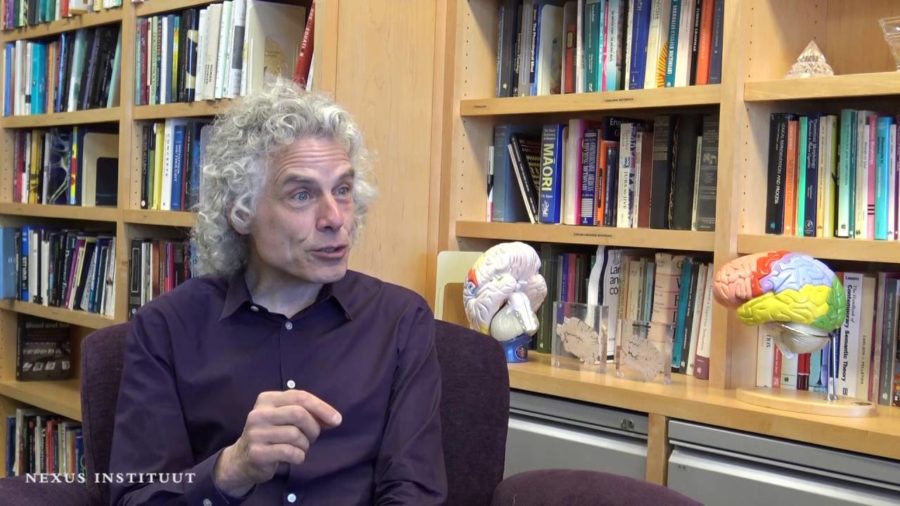Rob Riemen: Three years ago we organized a Nexus Conference entitled “The Triumph of Science.” And we also had people from the world of a transhumanism. And I was fascinated by the fact that based on a pretty pessimistic view on human nature, they think that due to the technology we are having we should improve human beings with this technology because the world is too dangerous, there are indeed nuclear weapons, and to make sure that the tragedies will not happen we should use new technology to improve human nature. What do you think about that?
Steven Pinker: I’m very skeptical. First of all I’m skeptical that we need to reengineer humans to achieve peace. Canada and the United States have not fought a war since the War of 1812. No one had to reengineer Canadians or Americans. The Netherlands and Germany have not fought a war in more than seventy years. We did not have to genetically engineer the Dutch. There are many changes to our institutions and our norms and our ideas that can reduce or eliminate the risks of nuclear war without what I consider a rather quixotic attempt to change the course of human evolution.
I’m also, on purely scientific grounds, highly skeptical of the prophecy that we will reengineer human nature. I think that these predictions came during the brief burst of enthusiasm for finding the gene for intelligence, the gene for altruism, and so on. We now know that there is no such “gene.” There are hundreds or thousands of genes, each of which are increments or decrements psychological traits by a tiny amount. To genetically engineer someone, it’s not a matter of sticking in one gene. You’d have to replace thousands of genes. We have no idea how to do that. We’re not going to know how to do it anytime soon.
And we also don’t know how many of those genes might lead to an improvement in one aspect and a risk in another aspect. There may be a gene that increases your IQ by two-thirds of a point but also increases your chances of getting brain cancer or bipolar disorder by a third of a point. And it’s going to be a very long time, if ever, until we know how to balance those tiny benefits and tiny risks multiplied by hundreds or thousands of genes. So on purely scientific grounds I doubt that it’ll happen. And then on historical grounds I don’t think we need it.
Riemen: What will be your choice, what is it that you think is essential to make sure that, in whatever form, “we can save the world?”
Pinker: We have to first of all have an empirical mindset. You’re right, there are many hypotheses. We have to look to see which ones have made the world better and which ones have made the world worse. I think the track record of messiahs is not particularly good. I think there’s an excellent reason to believe that there’s no such thing as a messiah and there never will be.
On the other hand, there are some things that do work. International institutions like the United Nations has decreased the probability of war. It hasn’t eliminated war, but it’s made it less likely. We have reason to believe that trade and cosmopolitanism, the movement of people and ideas, has been a positive force. We have reason to think that democracy has more advantages than disadvantages. And I think what we have to do is not believe that we can deduce what will make the world better from first principles and then impose them in full confidence that we know how the world is going to react. Because we don’t. We’re not that smart. But we really have to look at our past track record, look at the data. What makes people better off? What makes people worse off?
Riemen: Now, the conference will be the weekend after the American elections. Will you still say the same things if Mr. Trump will be the next President of America?
Pinker: I think it’s extremely unlikely, and all the indicators are that he will not be the next president. If he is president, I think that that would be definitely a negative development. And there’s no guarantee that all positive trends, such as the trend toward tolerance, cosmopolitanism, democracy, knowledge-guided decision-making, will continue. There are no iron laws that propel the world in a particular direction. There are contingent events that are unpredictable, so bad things could happen.
How bad could it be? Much depends… That is, if Trump were elected, much depends on how much a single man can control the entire apparatus of American government. Fortunately, American government has some checks and balances built in. There’s the Supreme Court. There’s the legislatures. There’s local governments and state governments. And just the willingness or reluctance of the American people to go along with particular policies. So as long as Trump doesn’t become the Führer, or like Mao, with absolute control (and I think that’s that’s unlikely), then the worst-case scenarios probably will not happen. But then, Trump being elected is itself a worst-case scenario that I think will probably not happen.
Riemen: Okay. Thank you very much, Steve Pinker, and we are very much looking forward to meet you again in Amsterdam.
Further Reference
Nexus Conference 2016, “What Will Save the World?”
